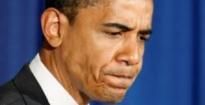Bartlett: How Obama Misplayed the Tax Card
One of the key sticking points, dating back to the presidential campaign, is President Obama’s desire to limit extension of the tax cuts to those with annual taxable incomes below $250, 000. His rationale has never been entirely clear. During the campaign he appeared mainly to be throwing "red meat" to the Democratic Party’s left wing; more recently he has been saying that it is primarily a deficit reduction measure.
Neither of these explanations is entirely satisfactory – and there were signs yesterday that Obama and his advisers may be mulling over a deal with the Republicans to extend the tax cuts to everyone. Insofar as the rich are concerned, Obama has always said that he would cap the rise in the maximum tax rate on capital gains and dividends at 20 percent from the current level of 15 percent. Historically, both capital gains and dividends, which constitute the bulk of the income of those with high incomes, have been taxed well above 20 percent.
Insofar as deficit reduction is concerned, while raising taxes on the well-to-do would certainly help, most serious budget analysts believe that higher taxes on those with incomes below $250,000 will also be necessary to get the deficit on a sustainable path. In fact, they view Obama’s insistence on making all the tax cuts for those below that income threshold permanent as a major impediment to getting the deficit under control. For example, economist Diane Rogers of the Concord Coalition made this plea to Obama back in April:
"I know you made an unfortunate campaign promise on tax policy that you feel bound to – to not raise taxes on any households with income under $250,000. But isn’t it more important to keep your greater (at least implicit) promise to the American people on keeping our economy strong, putting us on a better path ("changing" course), and leaving the nation in decent shape for our kids? You can’t keep both promises, and to me as an economist and as a mom – and I hope to you as our leader and a dad – it’s obvious which one you should abandon."
Republicans, however, are guilty of being unserious about either the deficit or tax policy. Their mantra is that all the Bush tax cuts should simply be extended permanently, as if they are the greatest thing since sliced bread. But as I explained in a recent column, there is really no evidence that they did much of anything to raise economic growth. Moreover, the fact that they were always designed to expire makes Republican claims that Obama’s policies are the primary source of economic uncertainty ring hollow. If Republicans really wanted to give taxpayers certainty on what their taxes will be next year, they should have worked a lot harder to make all provisions of the Tax Code permanent, instead of so often making them temporary in order to disguise the budgetary cost of their initiatives.
It should also be noted that the PAYGO (pay-as-you-go) legislation enacted earlier this year generally requires spending or tax cuts not in current law to be offset with spending cuts or tax increases. An exception was provided for extension of the tax cuts for those with incomes below $250,000, but tax cuts for the rich are required to be offset. However, Republicans have never put forward any means of paying for the tax cuts for those with higher incomes, even as they continue to assert their devotion to a balanced budget.
Under ordinary circumstances, it wouldn’t be hard to argue that Congress should just let all the Bush tax cuts expire and either permit a major reduction in the deficit to take effect automatically or replace them with permanent tax cuts that would do a better job of stimulating economic growth. Even some Republicans agree. Economist Kevin Hassett of the Republican-leaning American Enterprise Institute recently argued that simply extending the Bush tax cuts "locks in the status quo" and the status quo "stinks." He suggested several tax reforms that would do more to stimulate growth than the lame Bush tax cuts, such as cutting the corporate tax rate.
It’s hard to know whether Republicans would have ever been willing to negotiate with Obama in good faith on a different package of tax cuts in lieu of mindlessly renewing those that demonstrably failed to stimulate growth. It gets back to the argument I made last week that Obama was insufficiently engaged in economic issues. A greater focus on the economy might have led him to propose some tax cuts that Republicans would have had great difficulty opposing, such as a payroll tax cut.
Instead, Democrats harped on why taxes on the rich needed to be raised, thus giving them the image of being tax increasers at a time when voters were especially antagonistic to higher taxes. According to a September New York Times/CBS News poll, one of the things that hurt Democrats is that a third of taxpayers believe that Obama has raised their taxes and half thought they hadn’t changed, when in fact they had fallen substantially from 17.5 percent of the gross domestic product in 2008 to less than 15 percent in 2009 and 2010.
Curiously, Democrats in Congress didn’t even take the opportunity to vote on an extension of or replacements for the Bush tax cuts before the election. Even if they had stuck to their position on raising taxes on the rich, it would have at least aided them among the party’s base, according to an analysis by Democratic strategists James Carville and Stan Greenberg. By doing nothing, Democrats basically adopted the worst possible approach, politically.
Click here to read more.


